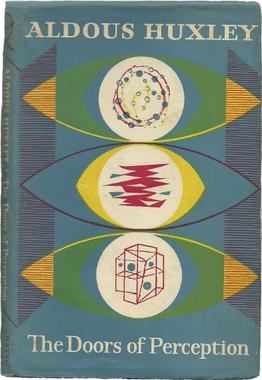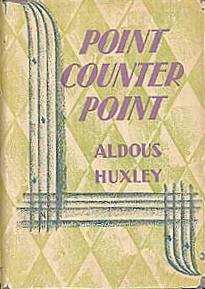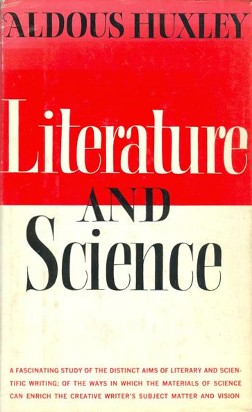
Aldous Leonard Huxley was an English writer and philosopher. His bibliography spans nearly 50 books, including novels and non-fiction works, as well as essays, narratives, and poems.

An essay is, generally, a piece of writing that gives the author's own argument, but the definition is vague, overlapping with those of a letter, a paper, an article, a pamphlet, and a short story. Essays have been sub-classified as formal and informal: formal essays are characterized by "serious purpose, dignity, logical organization, length," whereas the informal essay is characterized by "the personal element, humor, graceful style, rambling structure, unconventionality or novelty of theme," etc.

The Doors of Perception is an autobiographical book written by Aldous Huxley. Published in 1954, it elaborates on his psychedelic experience under the influence of mescaline in May 1953. Huxley recalls the insights he experienced, ranging from the "purely aesthetic" to "sacramental vision", and reflects on their philosophical and psychological implications. In 1956, he published Heaven and Hell, another essay which elaborates these reflections further. The two works have since often been published together as one book; the title of both comes from William Blake's 1793 book The Marriage of Heaven and Hell.

Brave New World is a dystopian novel by English author Aldous Huxley, written in 1931 and published in 1932. Largely set in a futuristic World State, whose citizens are environmentally engineered into an intelligence-based social hierarchy, the novel anticipates huge scientific advancements in reproductive technology, sleep-learning, psychological manipulation and classical conditioning that are combined to make a dystopian society which is challenged by the story's protagonist. Huxley followed this book with a reassessment in essay form, Brave New World Revisited (1958), and with his final novel, Island (1962), the utopian counterpart. This novel is often compared as an inversion counterpart to George Orwell's 1984 (1949).

Measure for Measure is a play by William Shakespeare, believed to have been written in 1603 or 1604 and first performed in 1604, according to available records. It was published in the First Folio of 1623.

Point Counter Point is a novel by Aldous Huxley, first published in 1928. It is Huxley's longest novel, and was notably more complex and serious than his earlier fiction.

Samson Agonistes is a tragic closet drama by John Milton. It appeared with the publication of Milton's Paradise Regained in 1671, as the title page of that volume states: "Paradise Regained / A Poem / In IV Books / To Which Is Added / Samson Agonistes". It is generally thought that Samson Agonistes was begun around the same time as Paradise Regained but was completed after the larger work, possibly very close to the date of publishing, but there is no certainty.

Henry FitzGerald Heard, commonly called Gerald Heard, was a British-born American historian, science writer and broadcaster, public lecturer, educator, and philosopher. He wrote many articles and over 35 books.
The Huxley family is a British family; several of its members have excelled in science, medicine, arts and literature. The family also includes members who occupied senior positions in the public service of the United Kingdom.

Literature and Science, published in September 1963, was Aldous Huxley's last book - he died two months after it was published. In it, he strives to harmonize the scientific and artistic realms. He argues that language is what divides the two realms and makes communication between them difficult. He analyzes the ways in which scientists and fiction writers use language differently to achieve their desired effects. Although he concedes that many differences in language use are inevitable, he urges both camps to seek mutual understanding and appreciation. He directs his argument primarily to fiction writers: "Whether we like it or not,” he tells them, “ours is the Age of Science."

Beyond the Mexique Bay is a book of travel essays by Aldous Huxley, first published in 1934. In it, he describes his experiences traveling through the Caribbean to Guatemala and southern Mexico in 1933. The work is named for a line in Andrew Marvell's poem, "Bermudas."

The Albany, or correctly, Albany, is an apartment complex in Piccadilly, London. The three-storey mansion was built in the 1770s and divided into apartments in 1802.

Eyeless In Gaza is an English musical duo of Martyn Bates and Peter Becker, based in Nuneaton, Warwickshire. They have described their music as "veer[ing] crazily from filmic ambiance to rock and pop, industrial funk to avant-folk styles." Formed in 1980, the group went into hiatus in 1987, re-emerging in 1993.

Sybille Bedford, OBE was a German-born English writer of non-fiction and semi-autobiographical fiction books. She was a recipient of the Golden PEN Award.

John William Navin Sullivan (1886–1937) was an English popular science writer and literary journalist, and the author of a study of Beethoven. He wrote some of the earliest non-technical accounts of Albert Einstein's General Theory of Relativity, and was known personally to many important writers in London in the 1920s, including Aldous Huxley, John Middleton Murry, Wyndham Lewis, Aleister Crowley and T. S. Eliot.
Seccotine is a brand of refined liquid fish glue first made in Ireland.
Eyeless in Gaza may refer to:

The following bibliography of Aldous Huxley provides a chronological list of the published works of English writer Aldous Huxley (1894–1963). It includes his fiction and non-fiction, both published during his lifetime and posthumously.
Eva Herrmann was a German-American painter, illustrator, draftsperson, and caricaturist.













